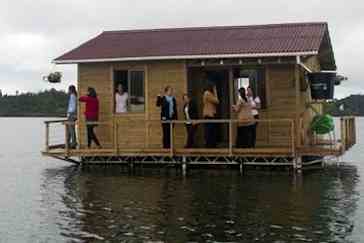Instead of bringing the water to our homes, why not bring our homes to the water? Especially at a time when rising sea levels threaten the flooding of some of the world’s greatest cities?
Aquatecture is a fundamentally new reappraisal of how we co-exist with the sea and rivers. Leading exponents include Baca Architects, London. Their first domestic project went on site last month.
The Netherlands, which The Washington Post sees as “the world’s premier lab for how to tame rivers and seas,” is also at the forefront of building “amphibious houses,” which are designed to adapt and respond to rising sea levels.
As architect Haiko Cornelissen points out, during times of flooding, each amphibious house is “able to float on the water, held in place by guides, and continues to function thanks to flexible utilities. The amphibious house is more a new type of construction than a new type of house.” If you’d like, you can even make them solar-powered, and live completely off the grid. Or, consider the cool concepts from WaterStudio.NL for waterfront living: floating villas, floating hotels, floating mosques, heck, even floating golf courses.
And, it’s not just the Dutch who are coming up with creative ideas for new living arrangements in the post-Sandy area. As part of design competitions hosted in the months after Superstorm Sandy hit, there have been numerous concepts for innovative housing that would respond to a Superstorm. Inhabitat recently featured six smart, flood-resistant homes. One of the neatest ideas is something the designer is calling Shut Up the House – it’s a beachfront home that converts into a tiny, folded wooden box until the storm passes over. And Rebuild by Design just unveiled 10 new innovative concepts for protecting waterfront communities.
But amidst all this fine talk, lets not forget the humble houseboat – moored on a canal or even a river – its a very low-tech solution to many existing urban housing problems.
powkey Portable Power Station 350W, 260Wh/70,000mAh Backup Lithium Battery, 110V Pure Sine Wave Power Bank with 2 AC Outlets, Portable Generator for Outdoors Camping Travel Hunting Emergency
Now retrieving the rating.
$192.98 (as of April 18, 2024 14:24 GMT +01:00 - More infoProduct prices and availability are accurate as of the date/time indicated and are subject to change. Any price and availability information displayed on [relevant Amazon Site(s), as applicable] at the time of purchase will apply to the purchase of this product.)200W Portable Power Station, Powkey 120Wh/33,000mAh Power Bank with AC Outlet, 110V 6 Outputs Solar Generator External Battery Pack with LED Light for Home Use and Outdoor Camping
Now retrieving the rating.
31% OffPortable Power Station 600W, Powkey 296Wh Battery Backup with 2 Pure Sine Wave AC Outlets, USB-C PD100W and 2 Wireless Chargers, Solar Generator (Solar Panel Optional) for Outdoor Camping/RVs/Home Use
Now retrieving the rating.
10% OffFoldable Solar Panel Charger 60W with 18V DC Output (11 Connectors) for 100W~350W Portable Power Stations Jackery/Rockpals/Flashfish/Enginstar, Portable Solar Generator for Outdoor Camping Van RV Trip
Now retrieving the rating.
$98.99 (as of April 18, 2024 14:24 GMT +01:00 - More infoProduct prices and availability are accurate as of the date/time indicated and are subject to change. Any price and availability information displayed on [relevant Amazon Site(s), as applicable] at the time of purchase will apply to the purchase of this product.)10W USB LED Light for Camping Garage Warehouse Car Truck Fishing Boat Outdoor Portable Bulb, Emergency Light, Children Bed Lamp
Now retrieving the rating.
$9.99 (as of April 18, 2024 14:24 GMT +01:00 - More infoProduct prices and availability are accurate as of the date/time indicated and are subject to change. Any price and availability information displayed on [relevant Amazon Site(s), as applicable] at the time of purchase will apply to the purchase of this product.)






One Response
I have lived in a float cabin on a lake for several years now. My cabin is remote and can only be accessed by a 25 minute boat ride. We have a widely spread community on our lake, but most cabins are used only in summer. We live in our about 75% of the year in all seasons. I wouldn’t trade it for anything. You can read more about it at my blog link. – Margy